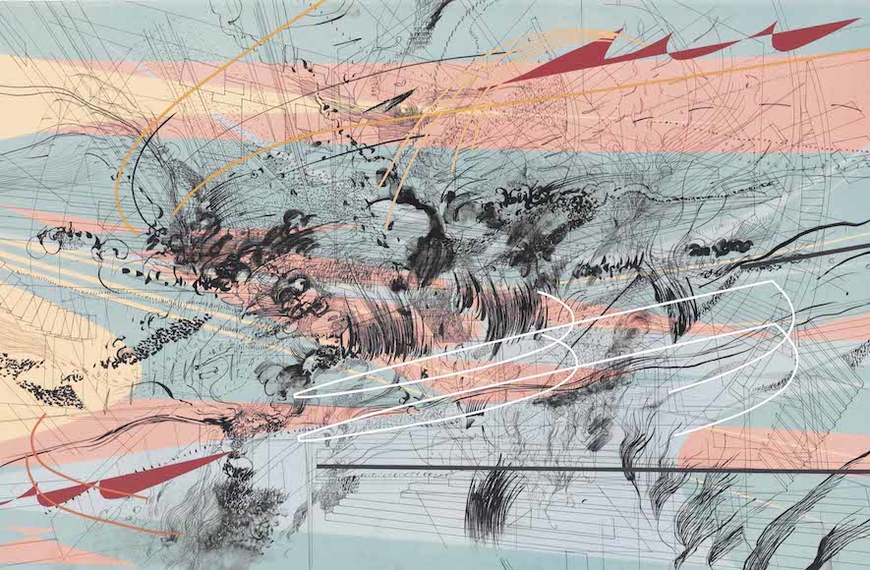Exploring Poetry Beyond Paper
"Excerpt (citadel)" by painter Julie Mehretu. Dubois sees her paintings as maplike networks that feel like maps of our time but also otherworldly.

“Studying in the humanities and/or in languages is not just about studying something useful—rather it is about striving to wander and wonder, which coincides with the idea that learning is joyful in that it never ends,” says Alexandre Dubois (PhD ‘19, French studies), whose dissertation focused on poetry, theology, and geography, specifically the idea that poetry which wanders is a response to the rigidity of modern modes of movement—like the 19th-century railway.
Dubois first attended the University of Minnesota as an exchange student from France and was so inspired by Professor Bruno Chaouat that he later returned to Minnesota to pursue his PhD here. During that time Dubois conducted research on a multitude of topics, spanning from game studies to 19th-century poetry.
Poetry Meets Geography
Dubois was drawn to 19th-century poetry because of so-called “damned poets,” whose poetic intentions are particularly unclear even though their pieces are written in seemingly clear language. What was it about their world that lead some poets at the time to write pieces which broke so many aesthetic rules? As Dubois explains, “the use of language is so abnormal that it helps conceive the words we use in our everyday life very differently. Within language lies the possibility to expand our perceptions and discussions about the world.”
Dubois’ deep understanding of literature combined with his interest in geography led him to a research project focused on poetry in relation to imperial expansionism, specifically the growth of the international railway system. Through examination of French maps and poetry, his research “aims to understand how new forms of poetry opposed these spatial representations that prefigured our contemporary navigation systems,” Dubois explains. “The maps displayed the hyper-connectivity of modern transportation systems in a way that empowered the reader’s sight and reenacted the conquest of territories.”
A renowned teacher, Dubois’ success at the U led him to a job at the University of Mississippi where he is currently teaching a class called The Poetics of Space. The course explores how humans read maps—shifting linearly from one point to the next—and relating that idea to literature. “Students investigate the influence of the railway’s infrastructure on maps and then try to see how poetry is displayed under new and nonlinear forms, which gives the reader the ability to escape the fixed landmarks associated with maps,” he says.
A Future in Education
Dubois greatly enjoys being a lecturer and believes the University of Minnesota prepared him well for the position. “Teaching while doing research during our graduate degree is a good way to get prepared for what comes next, since being a professor implies doing both things throughout your career,” he says.
Dubois plans to continue exploring French literature through teaching and research. He strives for lifelong learning stating, "I find wandering very important in conceiving learning not as an accumulation of knowledge, but rather as a slow process that requires one to think and meditate." As other professors did for him, his long-term goal is “to make students realize they are capable of much more than they often think.”
This story was written by an undergraduate student in CLAgency. Meet the team.



